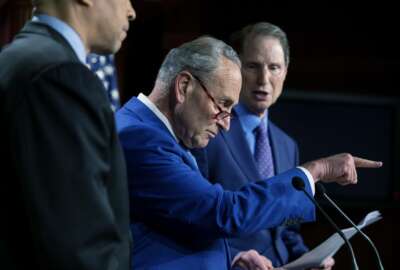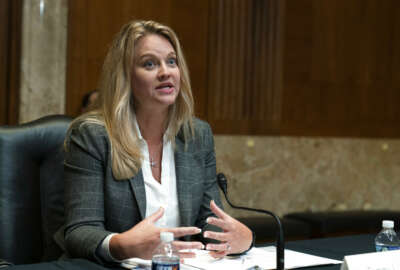COVID safety protocols, infrastructure and insurrection on Congress’ agenda this week
A Senate measure would bolster safety for when feds returned to the office. This and more updates from WTOP Capitol Hill correspondent Mitchell Miller.
Best listening experience is on Chrome, Firefox or Safari. Subscribe to Federal Drive’s daily audio interviews on Apple Podcasts or PodcastOne.
Interview transcript:
Tom Temin: They have time to think about this amidst everything else.
Mitchell Miller: Boy, there’s a lot of stuff going on. And this legislation co-sponsored by two Virginia senators – Mark Warner and Tim Kaine – two Maryland senators – Chris Van Hollen and Ben Cardin – as well as Ohio’s Sherrod Brown. This would be in honor of a federal worker from Virginia who died of complications of the coronavirus. They believe he was probably exposed to it at work. The legislation would require all federal agencies to establish and put online workplace safety plans after if this bill is approved. They could include COVID testing, contact tracing, cleaning protocols, distribution of personal protection equipment, all of these things that we’ve been talking about over the past year. And of course, with the variants again continuing to emerge across the country, this is actually a very highly relevant issue here on the Hill. Also, any guidelines related to requiring vaccinations would be included in this legislation. By the way, this comes as the deadline hits for federal agencies to submit their return to Office plans to OMB, as you know, but of course, many of those plans had been submitted a while ago with everybody coming back.
Tom Temin: That’s right, though today is the deadline under our latest version of policy here. And that’s only the plans. We don’t know really when this is all going to happen. But from what I hear people are thinking in terms of September is the beginning of the rollback of people where L’Enfant Plaza might get crowded again.
Mitchell Miller: Right, exactly, and that trickle is starting but that I think, is really when it’s going to start to hit as far as all the employees coming back.
Tom Temin: Okay. And infrastructure seems to be coming to a head, and that would affect a lot of agencies – should have happened. And what’s the latest that’s going to happen this week?
Mitchell Miller: Well, now we actually have a hard deadline. And this is really caused a ruckus here on Capitol Hill when Senate Majority Leader Chuck Schumer last week laid down the law and said I want to vote this coming week, this coming Wednesday, on the bipartisan infrastructure plan. This is of course, the $1 trillion plan that has Republican and Democratic support. But there’s been a lot of grumbling from Republican lawmakers after Schumer made that announcement, they want to make sure that everything is actually pinned down. And in the legislation. Of course, even as we speak, staffers are furiously trying to put this thing together and tried to get the actual printed version of legislation. So there’s still a lot of ifs and buts about this, what’s going to actually happen. And of course, Democrats need those at least 10 votes to get past that 60-vote filibuster threshold, to actually get to advance to debate on the bipartisan infrastructure plan. I talked about this with Virginia Sen. Mark Warner, who of course, has been in the middle of all of these talks and asked him if he was concerned that Republicans were going to fall off. He remains optimistic however, of course, he’s working very closely with a lot of GOP lawmakers on this and thinks that will eventually start moving through. And then at the same time, Schumer has told fellow Democrats that they need to get this $3.5 trillion measure so-called human infrastructure basically ready by the middle of this week, as well. So a lot of moving parts here on Capitol Hill right now.
Tom Temin: There’s just the physical question of bills that spend $4-$5 trillion. And let’s say there’s a page for every $10 million – who proofreads the stuff and even knows what’s in all that?
Mitchell Miller: Right, and only really the staffers that write it up for the lawmakers know exactly what’s in each parcel. There’s been some speculation that with all of this money, as you talk about coming out, this could be literally close to 10,000 pages. I mean, there will be a- definitely will be thousands and thousands of pages of all of these things that have to go into this. And of course, on the $3.5 trillion measure, there is so much stuff being stacked into that measure right now that that’s a whole ‘nother series of things that have to get to the of course, the budget resolution, which will be the first step to getting toward budget reconciliation. And then that’s where the democrats are hoping that they with only 50 votes, and potentially the vote of the vice president can somehow eke this through even without any Republican support.
Tom Temin: And with 10,000 pages, somebody could put in on page 4,324 that upon completion of the Missoula bridge, we shall declare Mickey Mouse “president of the United States” – that could become law, no one would ever know until it’s too late.
Mitchell Miller: There is no one I don’t think there’s anyone that will have actually read the entire legislation itself.
Tom Temin: “War and Peace” seems like a cinch compared to that. We’re speaking with WTOP Capitol Hill correspondent Mitchell Miller and Senate Democrats are also looking at the Postal Service. And Van Hollen once again on some of the delivery delays going on. That’s a festering problem, too, isn’t it?
Mitchell Miller: It really is. Maryland Sen. Chris Van Hollen has made no secret of the fact that he’s been very critical of the Postmaster General Louis DeJoy and a lot of these reforms that are being pushed through. They had a hearing last week and went over basically a lot of the issues that cropped up during the pandemic and are continuing to this point. And the Inspector General of the Postal Service, Tammy Whitcomb, just said, basically, there was not enough communication, going along with all of these districts across the country. And our area here in the Washington area is among the worst. The Baltimore district actually is the worst for on-time delivery. And the so-called Capital District circling around here in the Nation’s Capital is the third worst and Tammy Whitcomb basically told the panel that what was happening is they sent IG staff to all these districts, they found out that it was totally inconsistent about what they were doing. Some places, they were saying, well, we can’t do this because of overtime. Others said, no, we’re going to go ahead and do it with overtime. Some places, they are just literally leaving the mail on the dock if there’s not enough to fill a truck to go out. And of course, as you know, that’s been one of the big issues with DeJoy’s reforms is he wants to get everything more ground-based rather than getting it to various points to get on planes, basically arguing that over the long haul, that this will tighten up things for the Postal Service but certainly a lot of concern and a lot of skepticism, frankly, from lawmakers here about what the Postal Service is doing. But it’s going to be a long slog, as we know for any improvements to come with the Postal Service.
Tom Temin: And I guess the Bed Bath and Beyond lobby must be upset about slow delivery, too?
Mitchell Miller: Right, exactly. I mean, a lot of these deliveries, there were there was some testimony that in some cases, it wasn’t just a matter of a few days or weeks. But in some cases, people said that they waited months to find out what happened. And of course, there’s very little actual personal responsibility taken for a lot of these things. And of course, it’s not just late pieces of marketing mail or anything like that. As you know, they’ve pointed out, various people have pointed out that sometimes people are waiting for vital medicine that they need or a check that they were hoping to get from a federal agency. And so this has had a lot of repercussions and members of Congress say consistently, this is the one area where they get the most complaints from their constituents.
Tom Temin: Yeah, I remember as a kid, sometimes a story would pop up that a letter mailed before World War II would arrive, sometime in the 1960s. And while we have you, give us the situation of security – physical security – on Capitol Hill, that seems to be finally seeing the light of day.
Mitchell Miller: It is. Finally there is no more security fencing around the Capitol. That came down and it’s really been quite a breath of fresh air around here. You can tell the lawmakers are really glad to see that this has happened both from the Republican and the Democratic side. It doesn’t matter. They really all wanted it to come down. Nice to see as I come into work every day, just the things that you used to take for granted all the time. People jogging, people running with their pets, being on bicycles. So that’s the good news. On the negative side, right now there is a divide over security supplemental measure for Capitol Police and the National Guard who of course, incurred a lot of extra funding during the Jan. 6 insurrection and an after the insurrection. And right now basically, Republicans only want to pay for the Capitol Police extra funding and the National Guard funding. There’s a supplemental measure that Vermont Sen. Patrick Leahy wants to get through that would cover a lot of other things. So that this divide right now as we are here in the middle of the summer really threatens, according to the National Guard, some of the training that could be done next month and in the coming months. So that’s on the negative side. But on the positive side, I will say there are a lot more smiles around the Capitol grounds here as people just make their way into the U.S. Capitol. Unfortunately for the public, the Capitol will remain closed. And that of course goes back to the pandemic, the Capitol now closed for close to 16 months. That’s the longest the U.S. Capitol has ever been closed off to the public.
Tom Temin: All right, Mitchell Miller is Capitol Hill correspondent for WTOP. Thanks so much.
Mitchell Miller: You bet.
Copyright © 2025 Federal News Network. All rights reserved. This website is not intended for users located within the European Economic Area.
Tom Temin is host of the Federal Drive and has been providing insight on federal technology and management issues for more than 30 years.
Follow @tteminWFED






